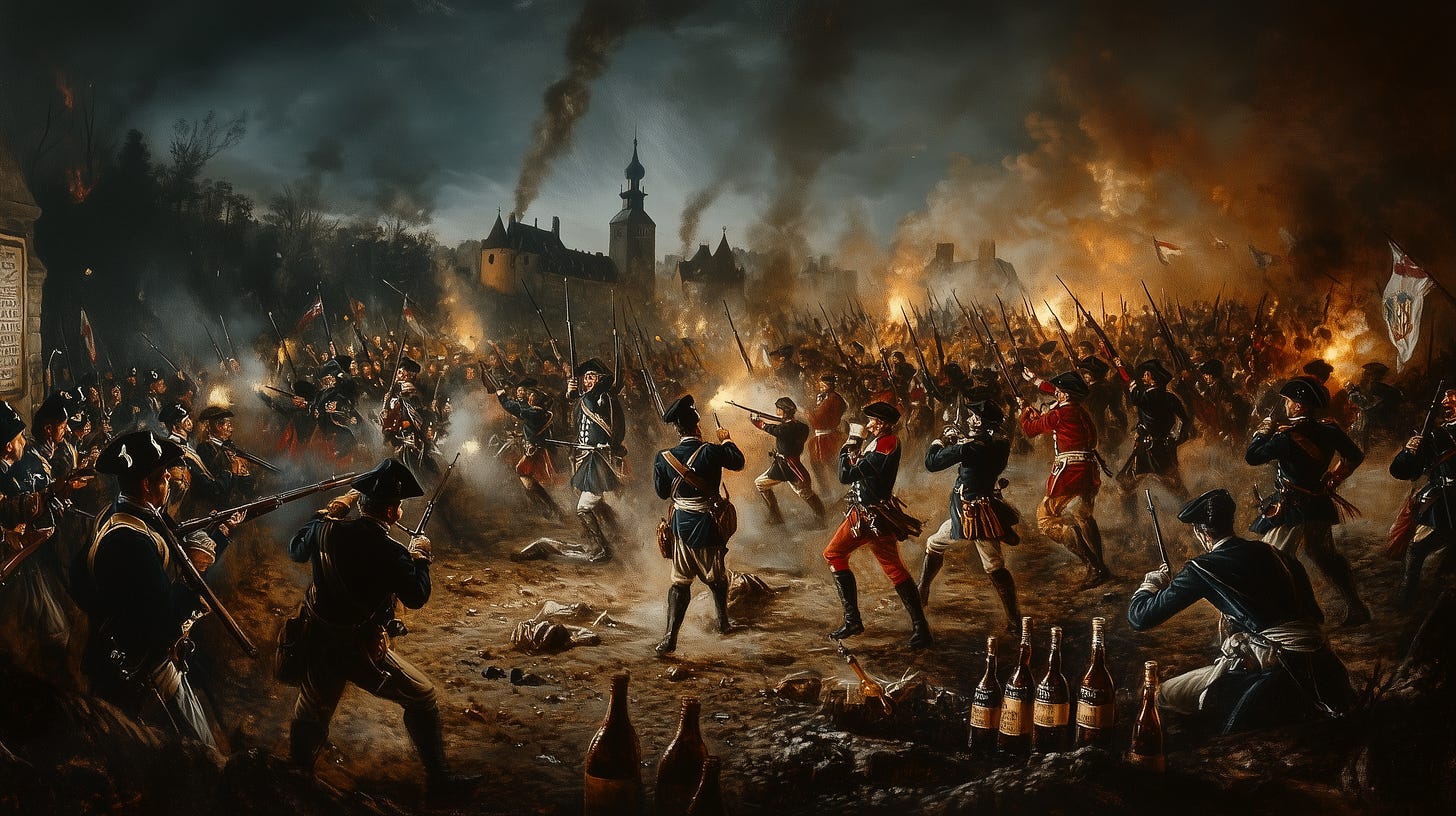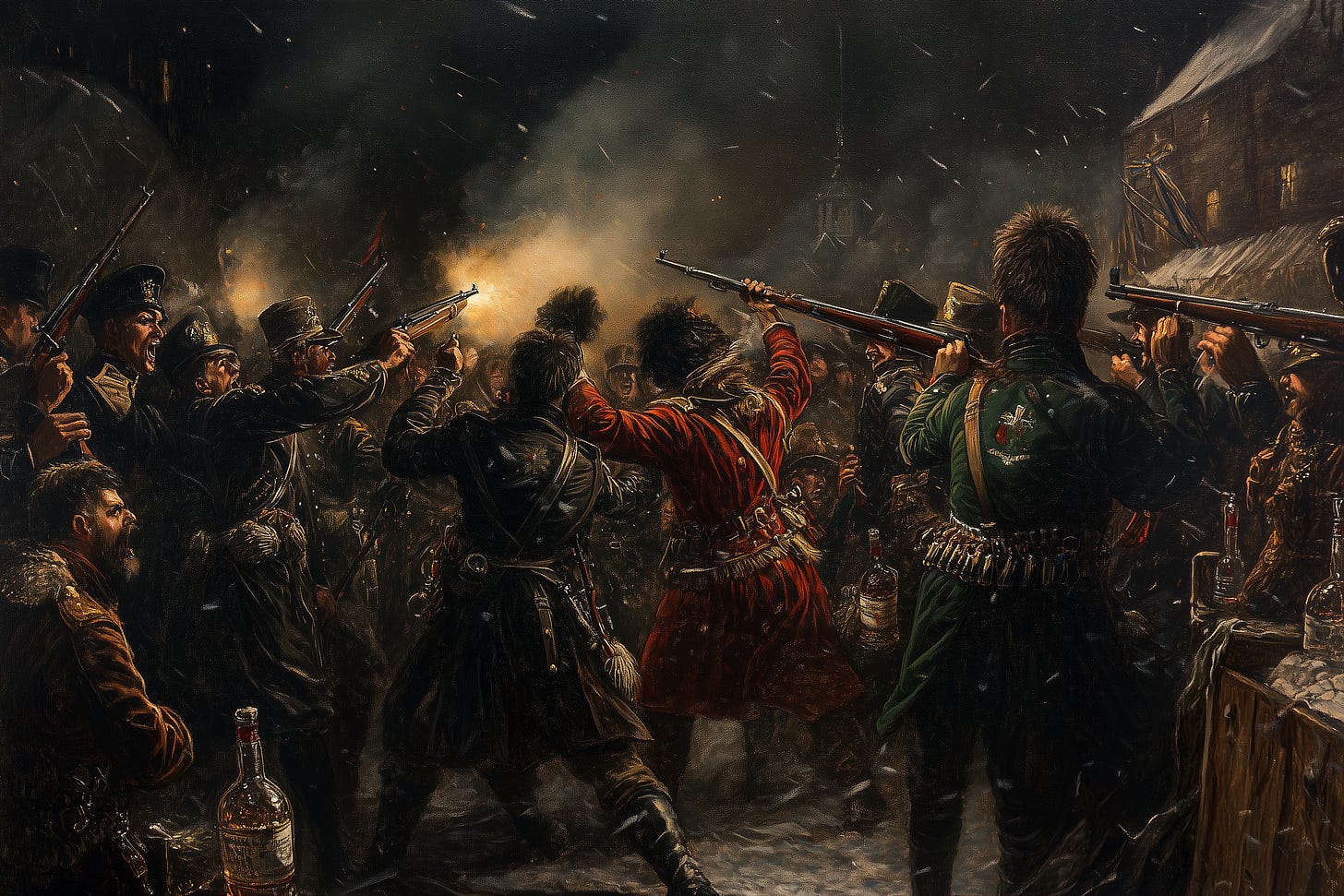The Battle of Karánsebes: When Booze and Confusion Turned an Army Against Itself
This is the tale of how an army defeated itself—all without the actual enemy firing a single shot.
In the tapestry of military history, few threads are as bizarrely tangled as the Battle of Karánsebes. Imagine an army so spectacularly confused that it managed to defeat itself before the enemy even arrived. This isn't the plot of a satirical novel, but a real event from the Austro-Turkish War of 1787–1791.
On the night of September 17, 1788, near the town of Karánsebes in modern-day Romania, the Austrian army—a diverse melting pot of nationalities and languages—was encamped along the Timiș River. As twilight fell, a series of misunderstandings, fuelled by alcohol and exacerbated by a language barrier, would spiral into one of the most embarrassing friendly fire incidents in military history.
The Spark that Lit the Powder Keg
What began with cavalry scouts stumbling upon Romani traders selling schnapps would end in a night of chaotic self-destruction that would make even the most hardened general wince. This is the tale of how an army defeated itself—all without the actual enemy firing a single shot.
As the inebriated Austo-Hungarian cavalrymen revelled in their liquid fortune, a group of friendly infantry stumbled upon the impromptu celebration. Drawn by the sounds of merriment, they demanded to partake in the festivities. The cavalrymen, already deep in their cups and feeling territorial, refused to share their prized schnapps. What began as a terse exchange quickly escalated into a heated argument, with insults flying freely..
In the midst of this alcohol-fueled dispute, a shot rang out. Whether fired in anger or by accident we don’t know, but that single gunshot would spark a chain reaction of chaos.
From Bad to Worse
As the echo of the gunshot faded, panic spread through the camp like wildfire. Soldiers, roused from their sleep and still groggy, heard shouts of "Turks! Turks!"
In the darkness and confusion, many mistook the commotion for an Ottoman attack. The multilingual nature of the Austrian army only added to the bedlam, as orders shouted in German were misinterpreted by Hungarian-speaking troops, and vice versa.
Officers, attempting to restore order, found their commands lost in the cacophony of languages or, worse still, misunderstood as enemy battle cries. The situation rapidly devolved into a free-for-all, with different regiments firing blindly into the night, often at their own comrades.
Lost in Translation:
The Austrian army's diversity was usually a strength, but on this night, it proved disastrous. Some common mishaps:
"Halt!" in German sounds like "Allah!" to Hungarian ears.
"Forward!" in Polish was mistaken for "Fire!" in German.
A Night of Mayhem
As the night wore on, the chaos only intensified. The darkness, combined with the lingering effects of alcohol and the general confusion, turned the Austrian camp into a battlefield—albeit one where the enemy was frustratingly absent. Soldiers fired at shadows, cavalry charged at imagined Ottoman lines, and entire regiments fled from nonexistent threats.
By dawn, the once-orderly camp resembled the aftermath of a battle—tents trampled, equipment scattered, and far too many soldiers nursing wounds inflicted by their own side. The exact number of casualties remains a subject of debate, with estimates ranging from a few hundred to several thousand.
The Ottoman Arrival
Two days later, when the actual Ottoman forces arrived at Karánsebes, they were greeted by a sight that must have been confusing.
They arrived two days later to find the area littered with the remnants of the once formidable Austrian forces, who had retreated in disarray.
The town fell with barely a fight, the Ottomans likely wondering if this was some elaborate trap rather than a gift of remarkable good fortune.
Lessons Learned
The Battle of Karánsebes stands as a testament to the fog of war. It serves as a cautionary tale about the dangers of poor communication, lax discipline, and excessive drinking in military camps. One can only imagine the awkward silence in the Austrian high command as they attempted to explain this debacle to Emperor Joseph II.
In the end, the Battle of Karánsebes remains one of history's most bizarre military mishaps. It's a reminder that sometimes, the greatest threat to an army isn't the enemy on the other side of the battlefield, but the chaos and indiscipline lurking within its own ranks.



